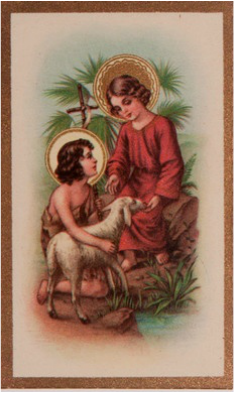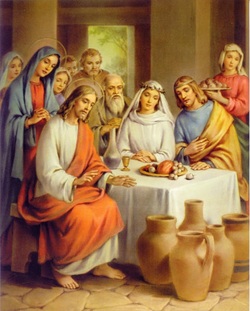First Point.—The character of these evangelical facts demonstrates their certitude. We observe at once they are important; they were extraordinary circumstances and calculated to arrest attention. At the birth of Jesus, the angels announced Him by a magnificent canticle ; a brilliant star announced Him to the people of the East; the Magi come to the palace of Herod to inquire for the newly born child. He is seen walking on the waters and commanding the tempest; in the middle of a repast He changes water into wine; with a few loaves He feeds many thousands of men; by a word He heals the sick and raises the dead to life. At His death the sun is obscured, the earth trembles, the veil of the temple is rent in twain. Facts so remarkable as these must necessarily attract public attention Moreover, these extraordinary facts must claim the liveliest attention, since their object was the abolition of the old worship and the foundation of the new one. The pagans on account of their attachment to idolatry, the Jews because of their respect for the Mosaic law, could not but take the most lively interest in these facts, which prepared destruction for their temples and synagogues.
The second character of the Gospel miracles is their publicity. They are not, as the false prodigies which some affect to compare with them, obscure or hidden facts, to which only a small number of competent witnesses testify. They are public facts, evident and easily verified. It was in all the cities of Palestine, in the public places, under the very eyes of the doctors of the law, that Jesus manifested His power. They on whom these miracles were performed are designated by name, by their dwelling, by their profession; they still reside, after their healing, in the same villages which witnessed their infirmities. The twofold fact of their malady and their healing is quickly known by their relatives and friends and fellow-citizens; their presence alone recalls to the whole country the prodigy to which they owe their health. Thus the very character of the evangelical facts destroys every suspicion of deceit and illusion, and alone should suffice to hinder us from questioning their truthfulness.
Second Point.—The certitude of the Gospel miracles comes from the character of the witnesses who attest them. And who are the witnesses who testify? They are, in the first place, the apostles and the disciples of the Saviour, and among them there are eight who present their testimony in writing. See, then, eight contemporary authors who recount facts of which they have been, almost all, witnesses or participators. And this is not enough; but beside these eight witnesses, whose writings we have, we know that, at the same time, the other apostles and all the disciples of Jesus, to the number of eighty at least, professed and proclaimed and attested the truth of the facts recorded. This important consequence must be admitted, that of all the most celebrated and unvarying facts of antiquity there are none so well attested as the miracles of Jesus. The history of Socrates, for example, is guaranteed by only two disciples, viz., Plato and Xenophon, still no one ever doubts concerning their narration. How does it happen, then, that any one could be found to deny the Gospel miracles ? What motive can the unbeliever allege to refuse the testimony of so many, who by their writings or their living words have transmitted to us the history of Jesus? Shall it be said they were deceived, or that they combined to deceive the world? These two suppositions cannot bear for a moment serious examination.
It is impossible for the apostles to have been deceived. Whatever idea may be formed of them, of their ignorance, of their credulity, we shall never persuade ourselves that during three entire years their Master could have been able to impose on them, and concerning daily facts so numerous and so visible. Ignorance and credulity do not go so far as that. There would remain a contradiction too shocking, between the idiotic character of the apostles, which must be admitted in this hypothesis, and their character which is evident from their writings, from their labors, and from their success. Therefore, the apostles have not been deceived.
It is equally impossible that the apostles wished to deceive. This impossibility is evident when we consider at what time, in what places, and before whom the apostles published the miracles of their Master. It was at the very moment when the facdts occurre; it was in the city of Jerusalem, the scene of the principal events; it was in the midst of a multitude of false witnesses, when the least deception would have sufficed to confound them. It must be admitted that the time, the place, and the persons were badly selected to propagate an imposition. In fine, these men, who are supposed to be cheats and impostors, preached the purest morality, practiced the sublimest virtues, astonished and confounded their persecutors by the simplicity, the ingenuity, and the noble assurance of their discourses. They converted the world by the sanctity of their lives, and at length died in the midst of torments. How could they do all this for the senseless pleasure of sustaining a falsehood? We cannot recognize in these traits of character either impostors or liars. But the apostles are not the only ones who give testimony to the truth of the Gospel miracles; they are recognized and admitted by the very enemies of Jesus. The Jews thought they would weaken their effect on the people by attributing them to the power of the demon, and hence they accused their Author of violating the tranquillity of the Sabbath. But these accusations were so many witnesses in favor of the Gospel facts, since to blame them was an affirmation of their existence.
Third Point—The miracles which Jesus wrought have existing monuments to give testimony for them. There is a monument, visible to every one and permanently abiding with us, which is constantly testifying to the truth of the miracles worked by our Lord and Saviour: it is the establishment of His Church in the world. It could not exist, in fact, except as a consequence and the result of miracles. Strive to form a just idea of the enterprise of the apostles. They labored to substitute an austere morality, all abnegation and penance, for a morality which was easy and convenient; they taught incomprehensible mysteries, instead of fanciful fables; they taught that He who had been crucified on an infamous cross must be adored; they must triumph over the repugnance of passions, the pride of reason, popular prejudices, and the power of the Roman emperors; and by what means shall all this be effected ? Here it is that the finger of God is most visible. Twelve poor fishermen, without credit, without eloquence, without wealth, without any human aid, undertake and execute the most extraordinary revolution which the annals of the human race have ever recorded. It is certainly most remarkable that under these unfavorable circumstances the apostles, sustained by the authority of miracles, should succeed; but that without miracles, and what is stranger still, with miracles reputed as false, they should succeed, this would be an inexplicable phenomenon, and a thousand times more incredible than all the miracles of Christianity. That the pagan world should abandon its false deities and embrace the religion of a crucified God, it must have had some reason for belief. But the apostles proclaimed nothing else except the miracles of Christ. The world has witnessed miracles, and miracles so certain that the sharpest and most discerning can discover not the slightest vestige of trickery or deceit. The establishment of the Christian religion is the most splendid proof of this, since it constantly testifies to the truth of the evangelical facts. Jesus Christ has, then, performed miracles; but God only can do this; therefore, Jesus is God.
Adorable Jesus, in the midst of blasphemies uttered by impiety, it is sweet for me to reflect on the titles Thou hast to my adorations as the Son of God and the Saviour of the world. Thus my faith is enlivened; and may my love also become more ardent. Amen.
Source: Short Instructions for Every Sunday of the Year and the Principal Feasts, Imprimatur 1897




 RSS Feed
RSS Feed